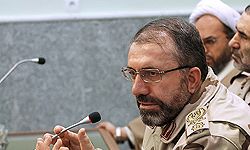Commander Assures Nation of Full Security at Eastern Borders

Commander of the Iranian Border Guard Units General Hossein Zolfaqari underlined his forces’ capability to maintain security all over the country, and underlined that security has been fully established at Iran’s Eastern borders.
“Basically, the number of insecurities in Eastern Iran has come to zero and we have come close to relative stability in the Western parts of the country as well,” Zolfaqari said on Wednesday.
Earlier, a senior Iranian police commander had also underlined that the country’s forces are powerful enough to protect security alongside the Iranian borders and confront all kinds of foreign challenges.
“Iran has learned how to answer foreign interventions during the three decades of threats and its progressive police is ready to confront any outside challenge,” Iran’s Police Chief Esmayeel Ahmadi Moqaddam said, addressing police personnel in Southern province of Hormozgan earlier this month.
He added that Iran is amongst the most secure countries of the region.
He further announced that Iran will boost the security of its borders as part of Iran’s Fifth Five-Year Development Plan (2010-2015).
Iran shares open borders on the West with Iraq and Turkey, on the East with Afghanistan and Pakistan, on the South with the Persian Gulf littoral states and the Sea of Oman, on the North with Armenia and Azerbaijan and the Caspian Sea, and on the North East with Turkmenistan.
Iran, located at the crossroad of international drug smuggling from Afghanistan to Europe, has taken new security measures in its border provinces following several attacks by terrorists and drug traffickers at its Eastern and Western borders.
The Iranian police measures along the Eastern borders have forced drug-traffickers to resort to other routes, including the Sea of Oman and the Persian Gulf, for smuggling their drug cargos which originate in Afghanistan and Pakistan.
According to the statistical figures released by the UN, Iran ranks first among the world countries in preventing entry of drugs and decreasing demand for narcotics.
A majority of insecurities at Iran’s Eastern borders pertained to the operations conducted by the terrorist Jundollah group in recent years, but after Iran arrested a large number of its members and hanged its leaders, the US-backed group was dismantled.
In the most recent clashes, four members of the terrorist Jundollah group were killed by Iranian security forces in the country’s Southeastern Sistan and Balouchestan province.
The U.S-backed and financed Jundollah group has claimed responsibility for numerous terrorist attacks in Iran. The group has carried out mass murder, armed robbery, kidnapping, acts of sabotage and bombings. They have targeted civilians and government officials as well as all ranks of Iran’s military.
In one of the worst cases, the terrorist group killed 22 citizens and abducted 7 more in the Tasouki region on a road linking the southeastern city of Zahedan to another provincial town.
In 2007, U.S-backed and financed Jundollah kidnapped 30 people in the Sistan and Balouchestan province and took them to the neighboring Pakistan.
U.S-backed and financed Jundollah claimed responsibility the same year for an attack on an Islamic Revolution Guards Corps (IRGC) bus in which 11 IRGC personnel were killed.
In another crime in October 2009, the Pakistan-based terrorist Jundollah group claimed responsibility for a deadly attack in the Sistan and Balouchestan province which killed 42 people among them a group of senior military commanders, including Lieutenant Commander of the IRGC Ground Force Brigadier General Nourali Shoushtari.







